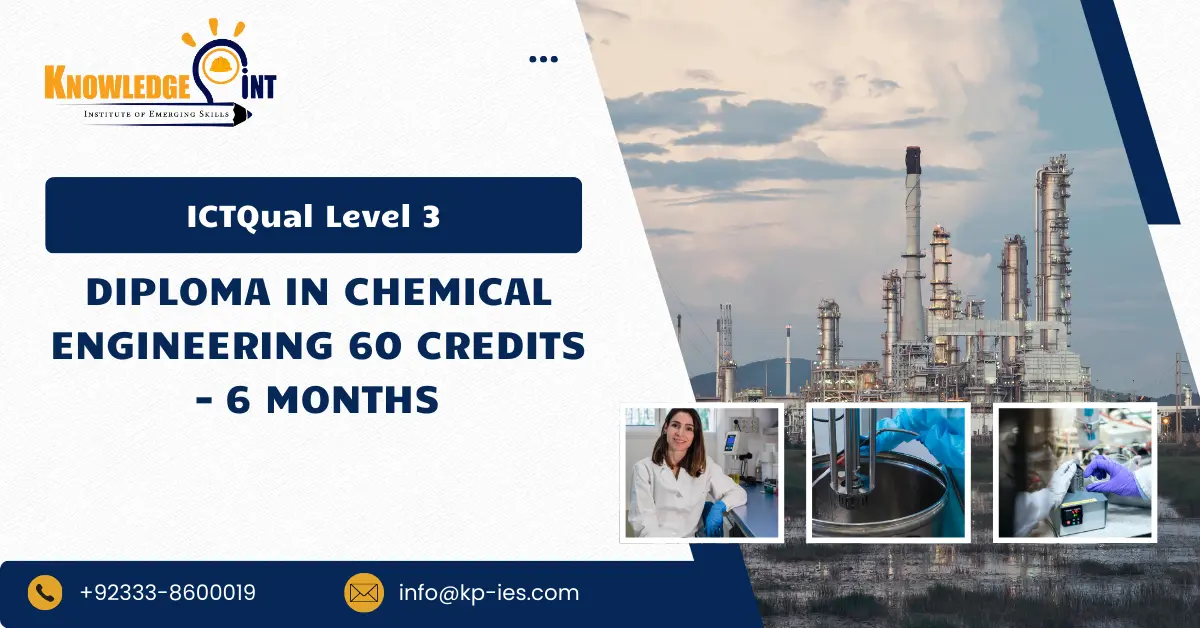Are you passionate about chemical engineering and eager to dive into the world of industrial processes and innovations? The ICTQual Level 3 Diploma in Chemical Engineering is the perfect starting point for anyone looking to build a solid foundation in this exciting field. With 60 credits awarded over a focused 6-month period, this diploma offers an intensive, hands-on learning experience that equips you with essential knowledge and skills in chemical engineering.
The ICTQual Level 3 Diploma in Chemical Engineering is designed to introduce students to the core principles of chemical engineering and prepare them for roles in various sectors such as manufacturing, energy, pharmaceuticals, and environmental engineering. In just six months, you’ll learn the fundamental concepts and gain practical experience in critical areas like chemical processes, machinery, safety, and environmental sustainability.
The ICTQual Level 3 Diploma in Chemical Engineering is an excellent choice for anyone looking to quickly build a strong foundation in chemical engineering. With a focused 6-month curriculum that includes both theoretical knowledge and practical skills, this program prepares you to enter the chemical engineering workforce or continue your education with confidence. Whether you’re seeking to start your career or gain the credentials for further study, this diploma provides the essential tools you need to succeed in the ever-evolving world of chemical engineering.
Course Overview
The ICTQual Level 3 Diploma in Chemical Engineering 60 Credits – 6 Months consists of 6 mandatory units which are as follows.
- Introduction to Chemical Engineering Principles
- Process Control and Instrumentation
- Fluid Mechanics and Transport Phenomena
- Chemical Reaction Engineering
- Safety, Health, and Environmental Considerations in Chemical Engineering
- Project Management and Communication in Chemical Engineering
The future progression of the ICTQual Level 3 Diploma in Chemical Engineering 60 Credits – 6 Months can lead learners towards several pathways, depending on their career goals and aspirations in the field of law and related sectors. Here are some potential avenues of progression:
Introduction to Chemical Engineering Principles
- Understand the Role of Chemical Engineering:
- Gain a clear understanding of the chemical engineering profession, its role in industry, and its impact on society and the environment.
- Apply Core Principles:
- Apply basic principles of mass and energy balances to simple chemical systems and processes.
- Identify Key Unit Operations:
- Recognize the key unit operations in chemical engineering such as heat transfer, mass transfer, and fluid flow.
- Understand Process Design Fundamentals:
- Understand the basic principles of designing simple chemical processes, including the selection of equipment and materials.
Process Control and Instrumentation
- Understand Process Control Concepts:
- Learn the fundamentals of process control systems, including feedback loops, control valves, and sensors.
- Apply Basic Control Strategies:
- Develop a basic understanding of process control strategies such as open-loop and closed-loop control systems.
- Identify Instrumentation and Measurement Techniques:
- Understand the role of instrumentation in monitoring and controlling chemical processes, and recognize common measuring instruments like pressure gauges, temperature sensors, and flow meters.
- Analyze Simple Process Control Systems:
- Analyze and interpret simple process control systems, focusing on their operation, stability, and performance.
Fluid Mechanics and Transport Phenomena
- Understand Fluid Flow Principles:
- Learn the fundamental concepts of fluid mechanics, including fluid properties (density, viscosity), flow regimes (laminar, turbulent), and flow behavior in pipes and channels.
- Apply Fluid Flow Equations:
- Apply basic equations such as Bernoulli’s equation and the Darcy-Weisbach equation to calculate pressure drops, flow rates, and velocity profiles in simple fluid systems.
- Understand Transport Phenomena:
- Gain an understanding of transport phenomena, including momentum, heat, and mass transfer, and their role in chemical engineering processes.
- Design Simple Fluid Systems:
- Design and analyze basic fluid transport systems, including piping networks, pumps, and valves, for chemical processes.
Chemical Reaction Engineering
- Understand Chemical Kinetics:
- Gain knowledge of reaction kinetics, including rate laws, reaction orders, and mechanisms, and how they relate to chemical reactions in engineering processes.
- Analyze Reaction Systems:
- Analyze simple batch and continuous reactors, determining key parameters such as reaction rates, conversion, and residence time.
- Apply Reactor Design Principles:
- Understand the basic principles involved in the design of reactors, including the distinction between ideal and non-ideal reactors.
- Design Simple Reactors:
- Design simple chemical reactors, applying concepts of chemical reaction engineering to optimize performance.
Safety, Health, and Environmental Considerations in Chemical Engineering
- Identify Safety Risks in Chemical Processes:
- Recognize potential hazards and risks in chemical engineering processes, such as chemical reactions, equipment failure, and material handling.
- Understand Health and Environmental Regulations:
- Gain an understanding of health, safety, and environmental regulations and standards that govern chemical engineering practices.
- Apply Safety and Risk Management Principles:
- Learn how to apply basic risk assessment techniques to identify hazards and develop strategies to mitigate safety risks.
- Implement Environmental Protection Strategies:
- Understand the environmental impact of chemical processes and learn how to apply sustainable practices to reduce waste, emissions, and resource consumption.
Project Management and Communication in Chemical Engineering
- Understand Project Management Fundamentals:
- Learn the fundamentals of project management, including planning, scheduling, budgeting, and risk management for chemical engineering projects.
- Apply Communication Skills:
- Develop effective communication skills for presenting technical information, both written and oral, to a range of audiences including stakeholders and team members.
- Work in Teams:
- Collaborate effectively in teams, managing responsibilities and contributing to project tasks in a professional and efficient manner.
- Manage Engineering Projects:
- Understand the stages of project management in chemical engineering, from initiation through to execution and completion, ensuring successful outcomes.
Course Benefits of theICTQual Level 3 Diploma in Chemical Engineering 60 Credits – 6 Months :
1. Comprehensive Knowledge and Skills
The course provides a broad foundation in agricultural engineering, combining essential knowledge in soil science, crop physiology, farm machinery, irrigation, and environmental sustainability. Graduates will be equipped with a diverse skill set that covers both the technical and theoretical aspects of modern agriculture. This multi-disciplinary approach ensures you can handle various challenges in the field.
2. Industry-Relevant Curriculum
The diploma is designed with input from industry professionals, ensuring that the curriculum remains aligned with the latest trends, technologies, and needs of the agricultural sector. With topics ranging from precision farming and renewable energy to advanced farm machinery and irrigation systems, students gain expertise in cutting-edge practices.
3. Hands-On Practical Training
The program includes practical training through workshops, fieldwork, and real-world projects. Students gain valuable hands-on experience with agricultural tools, machinery, and technology, allowing them to apply theoretical knowledge in practical settings. This ensures that graduates are work-ready and confident in their skills.
4. Career Flexibility and Opportunities
Graduates of the ICTQual Level 6 Diploma in Agricultural Engineering have a wide array of career opportunities in various sectors, including farming, agribusiness, machinery manufacturing, research, environmental consultancy, and renewable energy systems. The knowledge gained opens doors to positions such as agricultural engineers, farm management consultants, precision farming experts, and sustainability advisors.
5. Focus on Sustainability and Innovation
With increasing global concerns about food security, climate change, and sustainability, agricultural engineers are at the forefront of designing and implementing solutions that address these challenges. The diploma focuses on sustainable farming practices, climate-smart agriculture, renewable energy systems, and innovative technologies that help reduce agriculture’s environmental impact.
6. Strong Foundation for Further Education
For students interested in pursuing advanced degrees or specialized certifications, this diploma serves as a solid foundation for further studies in agricultural engineering, environmental science, or related fields. The research methods and final project component of the course also provide valuable experience for students who wish to pursue research roles.
7. High Demand for Agricultural Engineers
As the global agricultural industry increasingly relies on technology to improve productivity and sustainability, the demand for skilled agricultural engineers continues to rise. The course prepares graduates to meet this demand by equipping them with expertise in agricultural technology, automation, and resource management.
8. Contribution to Global Food Security
Agricultural engineers play a crucial role in addressing global food shortages, improving farming efficiency, and ensuring food security. By completing this course, you will be equipped to contribute to the development of innovative, sustainable solutions that increase agricultural productivity and support global food systems.
9. Exposure to Cutting-Edge Technologies
Students will be introduced to the latest agricultural technologies such as GPS, GIS, automation, and precision farming tools. With this exposure, graduates are prepared to lead in the field of agri-tech, using data-driven solutions to improve farming practices and operational efficiency.
10. Networking and Industry Connections
The program offers opportunities to connect with professionals, experts, and organizations in the agricultural engineering and agribusiness sectors. Networking during the course can lead to valuable internships, job opportunities, and collaborations, setting the stage for a successful career in the industry.
The ICTQual Level 3 Diploma in Chemical Engineering 60 Credits – 6 Months offers numerous opportunities for progression, both academically and professionally. As the agricultural industry embraces technological advancements and sustainability, the skills and knowledge acquired from this course provide graduates with a variety of pathways to enhance their careers and contribute to shaping the future of agriculture. Below are the key progression routes:
1. Advanced Higher Education Opportunities
Postgraduate Degrees
Graduates of the ICTQual Level 6 Diploma have the opportunity to pursue postgraduate studies to further specialize in agricultural engineering or related fields:
- Master’s in Agricultural Engineering: Specializing in advanced agricultural technologies, machinery design, or sustainable farming practices.
- Master’s in Environmental Engineering or Sustainability: Focusing on sustainable agriculture, resource management, and climate change mitigation in the agricultural sector.
- Master’s in Precision Agriculture or Agri-Tech: Delving into technologies such as IoT, artificial intelligence, and data-driven farming systems.
- Research-Based Programs: Pursuing a research-focused master’s or PhD program to contribute to innovations in agricultural practices, technology, and food security.
Specialized Certifications and Diplomas
For further specialization, graduates may opt for certifications or diplomas in areas such as:
- Precision farming systems
- Agricultural automation and robotics
- Renewable energy applications in agriculture
- Irrigation systems design
- Agro-processing technologies
2. Professional Development and Certification
Industry-Specific Certifications
As the agricultural sector continues to evolve with new technologies, graduates can enhance their credentials by pursuing professional certifications, including:
- Certified Agricultural Engineer (CEngAgric): A certification that demonstrates professional competence in agricultural engineering.
- Certified Irrigation Designer (CID): Specializing in the design and management of irrigation systems.
- Project Management Certifications: Ideal for graduates interested in managing large-scale agricultural engineering projects. Certifications like PMP (Project Management Professional) or PRINCE2 are highly valued.
- Agri-Tech Specialist Certifications: As agricultural technology advances, certifications in areas like precision farming, automation, and digital farming tools are increasingly in demand.
3. Career Progression in the Agricultural Sector
Leadership Roles
Graduates with the ICTQual Level 6 Diploma can pursue leadership roles across a range of agricultural sectors, such as:
- Agricultural Engineer
- Farm Operations Manager
- Sustainability Consultant
- Technical Director in Agri-Tech Companies
- Agribusiness Manager
- Renewable Energy Systems Manager for Farms
Entrepreneurial Opportunities
Graduates can also take the entrepreneurial route by starting their own businesses or consultancy services. Potential areas for innovation include:
- Agricultural machinery design and manufacturing
- Irrigation system solutions
- Renewable energy installations for farms
- Smart farming solutions and sustainable agriculture practices
- Agro-processing services and solutions
4. Specialization in Cutting-Edge Agricultural Technologies
With the continuous advancement of technology in agriculture, graduates can specialize in emerging areas, including:
Agri-Tech Innovation
- Developing and implementing new technologies like drone-assisted farming, robotic harvesters, and autonomous tractors.
- Utilizing data analytics, machine learning, and artificial intelligence to improve farming practices and optimize resource use.
Climate-Smart Agriculture
- Designing solutions that help farmers adapt to climate change, such as water-efficient irrigation systems and resilient crop varieties.
- Promoting carbon-neutral farming and other environmentally-friendly agricultural practices.
Renewable Energy Integration
- Specializing in renewable energy systems for agriculture, such as solar, wind, and biogas solutions.
- Designing energy-efficient systems for farms to reduce operational costs and improve sustainability.
5. International Opportunities and Global Impact
Graduates of this diploma can also explore international career opportunities, where the demand for skilled agricultural engineers is high:
- International Development Projects: Work with global organizations, NGOs, or government agencies to implement sustainable agricultural practices in developing regions.
- Global Agri-Tech Companies: As the agri-tech sector grows worldwide, there are opportunities to work with companies that develop smart farming solutions and technologies.
- Collaboration with NGOs: Engineers can contribute to food security and agricultural development initiatives in regions facing challenges in food production.
6. Research and Innovation
For those interested in advancing the field through research, there are multiple opportunities to contribute to agricultural innovations:
- Agricultural Researcher or Scientist: Work with universities, research institutes, or private companies to develop new technologies and practices that improve productivity and sustainability in agriculture.
- Collaborative Projects: Participate in research projects that aim to improve agricultural practices through technology, sustainability, and innovation.
- Product Development: Work on developing new agricultural machinery, automation systems, and other innovative technologies that address the challenges facing modern farming.







